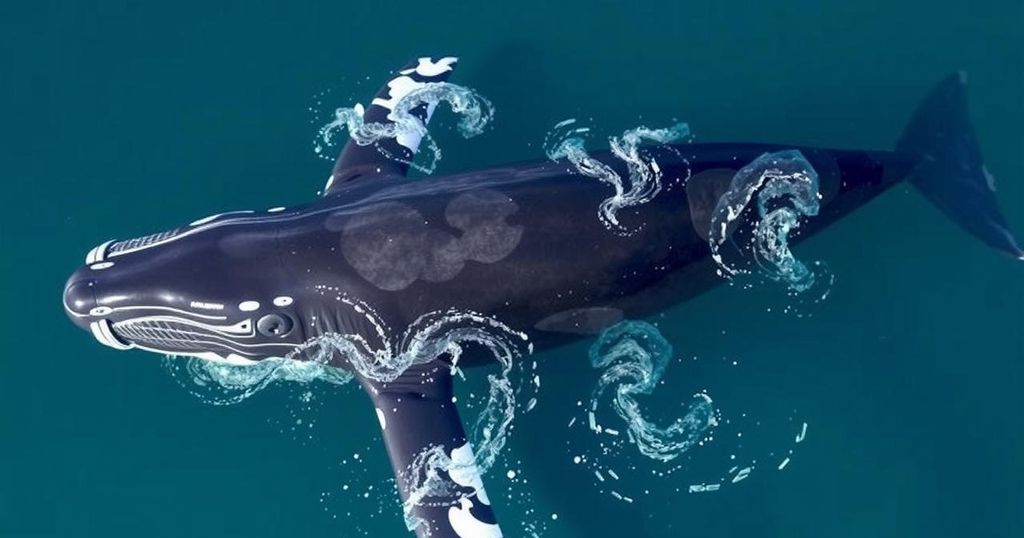Unprecedented Humpback Whale Migration Raises Concerns for Conservation Efforts

Recent studies have shown unusual migratory behaviors in humpback whales, with one individual traveling well beyond typical routes. Researchers suggest these shifts may stem from climate change and its effects on food sources like krill. Despite some indications of potential population recovery due to conservation efforts, the changes raise concerns about biodiversity loss and highlight the necessity for conservation strategies to mitigate these climatic impacts.
Recent observations of humpback whales have raised significant concerns among scientists regarding their migratory behaviors. Traditionally, these majestic creatures migrate from warmer tropical breeding areas to cooler feeding locations. However, a particular humpback was recently documented traveling far beyond its expected migratory route, leading researchers to investigate the implications for the overall humpback whale population. This specific whale was spotted in Zanzibar after being initially identified off the coast of Colombia several years earlier, confirming its unique and extensive journey.
A research team published their findings in the journal Royal Society Open Science, highlighting possible factors for this unusual behavior. Dr. Ekaterina Kalashnikova, the lead researcher, emphasized that the precise reasons remain unclear, but they speculate that global climate change, more frequent extreme environmental events, and evolutionary adaptations may contribute to this atypical migratory pattern. These evolutionary responses are critical as climate change continues to challenge the established behaviors of species like the humpback whale.
The research underscores the relationship between humpback whale migrations and the availability of krill, their primary food source. Research from the University of Oregon indicates that climate-related factors, particularly warmer ocean temperatures, influence krill populations and their reproductive cycles. If the food supply continues to falter due to these environmental shifts, it may lead to detrimental outcomes for humpbacks, including increased mortality rates from exhaustion during their search for sustenance. This scenario reflects a broader concern about biodiversity loss stemming from anthropogenic factors.
The research team also posited that such migratory behavior might indicate an increase in humpback populations, potentially due to effective conservation strategies, although this theory remains unverified. As the study progressed, it became evident that the insights gained could inform future conservation efforts and strategies aimed at mitigating the impacts of climatic changes on marine ecosystems.
A thorough understanding of whale migratory trends is vital for the strategic establishment of protected marine areas, ultimately aiding in the preservation of biodiversity and the prosperity of marine life. Even in the face of changing behaviors, the emphasis remains on reducing global pollution to support the survival of as many species as possible amid the threats posed by climate change.
In conclusion, the recent documentation of unprecedented humpback whale behavior highlights the complex interplay between climate change, species adaptation, and migration patterns. As we strive to understand these dynamics, the need for informed conservation efforts becomes increasingly pressing.
Humpback whales are renowned for their long migrations from tropical breeding grounds to colder feeding areas. Such migrations are influenced by various factors including environmental conditions and food availability. The recent sightings of a humpback whale exhibiting extraordinary migratory behavior prompted researchers to investigate the implications for whale populations. These changes could signal broader ecological shifts driven by climate change and anthropogenic impacts on marine life. Effective conservation strategies are crucial to mitigate these changes and support whale populations.
The changing migratory patterns of humpback whales due to environmental shifts emphasize the urgent need for continued research and conservation efforts. By better understanding these behaviors, researchers can play a pivotal role in protecting marine ecosystems and ensuring the survival of humpback populations. As climate change continues to disrupt natural behaviors and food sources, it is imperative to adopt strategies that address pollution and environmental degradation to foster a sustainable future for marine wildlife.
Original Source: www.thecooldown.com






